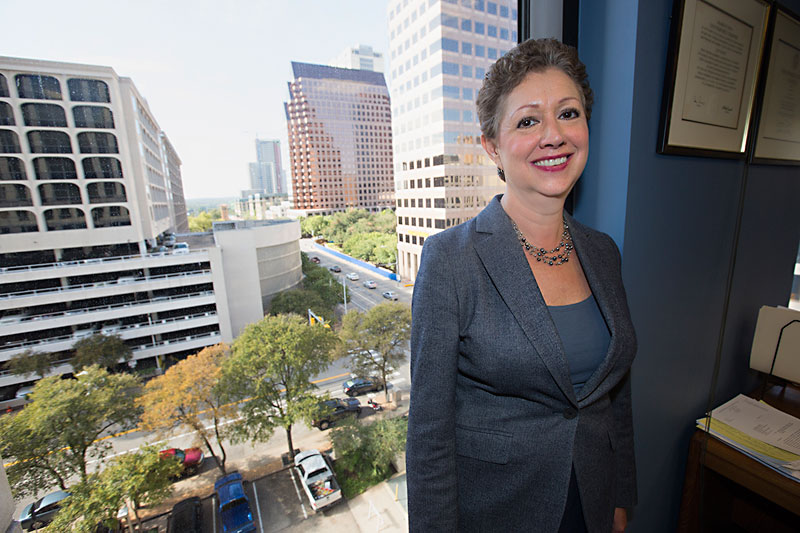Soifer Helps Lead Abortion Fight

Austin attorney slams state claims in HB 2 case
– By Mary Tuma, Photo by Jana Birchum, Austin Chronicle, 11/20/2015
When local attorney Jan Soifer picked up the phone and was told Texas abortion clinics planned to file suit against the state for its draconian law expected to nearly eradicate access to the constitutionally protected procedure, she was ecstatic. Her excitement grew as the lawyer on the other end asked if she wanted to help represent them.
“I was just thrilled to be able to say yes; I turned to my husband and said this is why I went to law school – to do litigation that really makes an impact,” she says during a recent interview at her Downtown law office. As former chair of the Travis County Democratic Party, Soifer wrangled the orange army for late-night rallies and committee hearings while the law snaked its way through the Capitol in 2013. “I think that what the state has done to women’s health care under the influence of the far right is outrageous and inexcusable. Being able to help fight back is one of the greatest honors of my professional career.”
Soifer, along with counterparts at the New York-based Center for Reproductive Rights, now take their fight up to the U.S. Supreme Court, which agreed to hear the case on Friday, Nov. 13. The decision is expected to hold nationwide implications and determine abortion restrictions for decades to come. As a progressive champion and trailblazer with more than three decades of legal experience, she’s had her whole life to prepare.
Pushed into high school debate and speech class by her mother as a way to shed her shyness, Soifer eventually developed a gift for public speaking and argumentation. She attended Yale as an undergraduate and then, the UT-Austin Law School, where she graduated in 1982. Originally from Houston, Soifer says she always assumed she would end up back in the Bayou City, but after law school in Austin, she felt drawn – as many are – to stay for as long as possible. And one of the largest law firms in town helped secure that future for the young attorney. Now called Husch Blackwell, the then-male-dominated firm offered her work in the real estate field, but Soifer had her sights set on arguing before the court at a time when the firm had no women in litigation. “No offense, but I want to do trial work,” she told her bosses. “If you don’t have a place for me in your litigation group I guess I’ll find somewhere else to go.” The trial partners invited Soifer to the Headliners Club, and in a meeting later referred to as the “Whiskey Test,” they grilled her with questions until she “passed” the men’s club exam to be the first woman trial lawyer at the firm. “There were not a whole lot of women who did litigation back then. It was relatively rare even in this progressive city; most women in the field typically did family law.”
Soifer started her law career with insurance defense and product liability cases. She also served as the chief of the Texas Attorney General’s Charitable Trusts Section and deputy chief of the Consumer Protection Division. While there, Soifer recalls going head-to-head with the Ku Klux Klan over a housing discrimination suit. “I enjoyed the fact that it was me, a Jewish woman, and the other attorney, an African-American woman, prosecuting their lawsuit. They had to send DPS agents when we took their depositions.” After her AG stint, Soifer was offered a partnership role at firm Locke Lord. For the past 10 years she’s focused her efforts on representing whistle-blowers in government and nonprofit fraud cases. She continues that work with her husband, Pat O’Connell, a fellow attorney at the law firm they started in 2010. (How does Soifer like working across the hall from her husband? She said they swore to never do so, but it turns out they mesh professionally. “Our strengths and weaknesses are complementary, so it works really well,” she says.)
Yet it is the social justice cases, in particular, that helped propel Soifer’s profile to new heights.
In February, local residents Suzanne Bryant and Sarah Goodfriend quietly wed outside the Travis County Tax Assessor-Collector’s Office on Airport Boulevard, marking the first gay marriage in Texas. A longtime friend of the couple and an LGBT advocate – Soifer led local organizing in opposition to the 2005 state constitutional amendment banning same-sex marriage – she offered up her firm’s office for the inevitable press conference and had TCDP host a celebration party for the newlyweds. That day, Soifer was fielding press calls from not just around the country, but from around the world. “I look at them and look at their kids and think, ‘Why shouldn’t they have the same rights as Pat and I do? Why should they and their kids be treated like second-class citizens?’ It’s just not right,” says Soifer. In July, she helped represent gay couple Jim Cato and Joe Stapleton against the Hood County Clerk, who refused to issue them a marriage license after the U.S. Supreme Court’s Obergefell ruling – within hours of filing a federal suit claiming a violation of constitutional rights, Hood County granted the couple a license. “The religious right out there thinks that their interpretation of religion is the only correct one. I find that really offensive,” says Soifer. “I look forward to a day when we can truly make sure church and state are separate.”
And then there’s the Texas abortion law. Commonly referred to as House Bill 2, the multi-part law has already led to the closure of half of the state’s abortion clinics. The final provision – a requirement that forces clinics to change their building codes to meet that of mini-hospitals – is estimated to shutter all but nine clinics. In Whole Woman’s Health v. Cole, the ongoing challenge to the law mounted by Soifer and CRR, the state of Texas argued during trial that the rules – drafted by zealous anti-choice lawmakers – protect the safety of women, despite several actions that run counter to regular medical procedure.
“The idea that the state’s interest is in the health and safety of women is ridiculous,” says Soifer. “That was never what this was about. Anyone with half a brain knew that this was all about satisfying the far right’s anti-abortion fervor, and some of the legislators even publicly said they were doing everything they could to eliminate abortion.” She puts it another way: As a UT trial advocacy adjunct professor of 16 years, Soifer remembers telling her students during a practice skills course there are times when the other side is behaving in such a disingenuous way that the word you might use to best describe it – “chickenshit” – would not be appropriate in open court. “The polite way to put it is that it was all a pretext,” says Soifer, of the state’s claims.
Conservative state lawmakers, she says, have strategically tried to make inaccessible what they can’t make illegal. “What frustrates me to this day is the fact the Supreme Court says that we as women have a right to safe legal abortions, and the state of Texas, knowing that it can’t completely outlaw it, has done everything it can to block access – and a right you don’t have access to is no better than no right at all.” Also angering the local attorney is the fact that the law, which adds expensive and time-consuming obstacles to abortion access, will disproportionately hurt the state’s poorest women. “This was never going to affect those lawmakers or their families, because people with means will always be able to get access to safe, legal abortion. They can afford to travel to another state, for instance,” she says. “This was always about punishing poor women, and keeping barriers in front of women whose lives are already so difficult. And that offends me so deeply.”
The integrity of the court system weighs heavily on her mind as of late: Soifer has departed her leadership role at the TCDP for a shot at being judge of the 345th District Court. Encouraged by close friends and family, she begins her second campaign for judgeship following Judge Stephen Yelenosky‘s retirement (in 2004 she suffered a defeat after being branded a Republican by opponents, a label she scoffs at). Soifer is already seeing support from dozens of Democratic officials, including former gubernatorial candidate Wendy Davis and City Council Members Pio Renteria and Greg Casar. If she wins, Soifer would take office in January 2017 – meaning she won’t be deterred from staying fully involved with the HB 2 case, as it is expected to be resolved by June.
She’s optimistic, along with CRR, that the high court will indeed side with Texas abortion providers. “It’s going to be a closely divided court, but I’m hopeful Justice Kennedy will do the right thing,” she says, right before – in the spirit of a true public servant – stressing the importance of voting. “This is why I fight so hard to remind people to vote – we need more Democratic presidents to solidify the majority of the court sides in favor of civil and women’s rights. There’s just so much at stake.”
Political advertising paid for by the Jan Soifer Campaign in compliance with the voluntary limits of the Judicial Campaign Fairness Act, and in compliance with the Code of Fair Campaign Practices, Reverend Joseph C Parker Jr., Treasurer.
